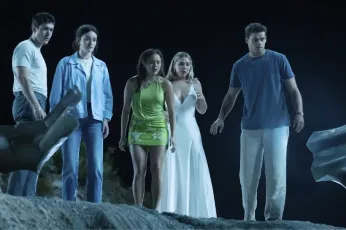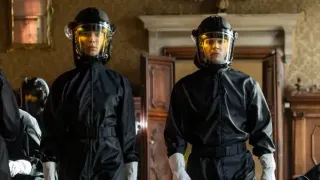
Jul 21
Nostalgia and gore collide in the new ‘I Know What You Did Last Summer’
Mark Kennedy READ TIME: 3 MIN.
The new “I Know What You Did Last Summer” pretty much follows the plot of the 1997 film of the same name: A bunch of well-to-do young people get stalked and killed by a vengeful killer in a rain slicker with an ice hook. It even has some of the same stars.
“It’s 1997 all over again. It’s so nostalgic,” says Freddie Prinze Jr., who stars in both, this time around. Responds another returning star, Jennifer Love Hewitt: “Nostalgia is overrated.”
That line deserves a big laugh from a so-called “legacy sequel” that blends old and new to resurrect a franchise long dormant but isn’t sure where it sits in 2025. A wink here, an eye-gouging there.
By aping the structure of the original — maddeningly calling itself by its predecessor’s name — the new version of “I Know What You Did Last Summer” is both too tentative a step forward and yet too reliant on the past to fully break free of that gravitational pull.
The new installment follows a group of post-high school friends (Madelyn Cline, Chase Sui Wonders, Jonah Hauer-King, Sarah Pidgeon and Tyriq Withers) who cause a fatal car wreck on July Fourth and swear to keep their involvement a secret. But a year later, someone wants them dead, offering the anniversary warning: “I know what you did last summer.”
This is a franchise that got a bit lost in the shadow of the “Scream” dynasty , but still helped make household names of such Gen X heroes as Prinze, Hewitt, Sarah Michelle Gellar and Ryan Phillippe. A relaunch makes sense but it’s pretty vapid stuff until the OGs arrive.
In fact, you may find yourself rooting for the killer. The five youngsters who have grown up in Southport, North Carolina — “the Hamptons of the South” — mostly live lives of nepo privilege, drinking from flasks, driving Volvos, munching on macarons and taking Adderall. One lives on a 156-foot (48-meter) yacht with three decks.
The movie mostly muddles along like a TV special, only coming to life when Prinze and Hewitt arrive, asked by the hunted youngsters for guidance. After all, the duo survived the 1997 attacks. “Get them before they get you,” Hewitt’s Julie advises.
Director Jennifer Kaytin Robinson, who co-wrote the screenplay with Sam Lansky, mixes gruesome stabbings, harpoon impalings and corpses displayed on hooks like fish at the dock with jokes that needle everything from Nicole Kidman’s cheesy AMC commercials to our fling with true-crime podcasts.
The filmmakers make half-hearted attempts to explain the ripple effects from trauma but we’re not here for generational pain; we’re here for the slashy-slashy. There is one dream sequence with a surprise returning OG that’s worth the ticket price alone.
The tone is all over the place — whimpering victims one moment, horny the next. The police in Southport are nefarious — in a nod to “Jaws,” they cover up the murders for fear of turning off tourism — but there’s a “Scooby-Doo” vibe here (even a mention) that seems less playful than idea-deprived. There are elements of spoof, too, like a vain woman who has just lost someone close in a grisly bloodbath but worries about her skin care.
Look, we hate to break it to you, it’s not going to end well for many of this privileged set, as they hunt whoever is hunting them. Coherence is also stabbed a lot because a clear motive for the mass murder is really hard to understand.
No matter: We get the scene when a scared victim with a massive knife sticking out of her back shoots a harpoon gun at the hook killer, and that’s why we came in the first place. We also get Hewitt screaming her catchphrase, mocking her attacker: “What are you waiting for?” Well, what are you waiting for?
“I Know What You Did Last Summer,” a Sony Pictures release in theaters Friday, is rated R for “bloody horror violence, language throughout, some sexual content and brief drug use.” Running time: 111 minutes. One and a half stars out of four.






